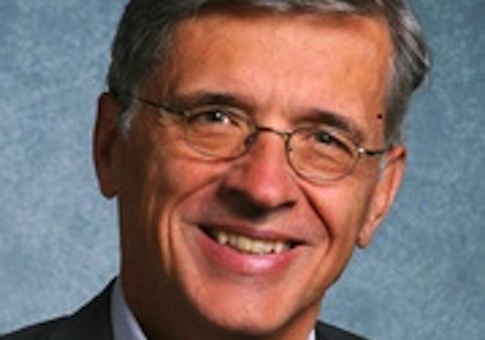President Barack Obama’s top choice to chair the Federal Communications Commission spent decades at the helm of two major communications industry lobbying organizations, sparking backlash from tech policy groups and internet freedom activists.
Tom Wheeler, a venture capitalist who bundled up to $500,000 for both of Obama’s presidential campaigns, is the top contender for the FCC role, Time magazine reported last week.
Wheeler served as president of the National Cable and Telecommunications Association (NCTA), the chief trade association for the cable TV industry, from 1979 to 1984. The NCTA spent nearly $19 million lobbying in 2012, focusing on FCC-related policies, including broadband and spectrum issues.
He later worked as CEO of the wireless industry trade association, the CTIA, from 1992 to 2004. The group reported over $16 million in lobbying expenses during the last four years of Wheeler’s tenure. The CTIA supports federal restrictions on cell phone "unlocking"—altering a phone you own so it can work on any carrier—a policy the next FCC chair will likely address in Obama’s second term.
Wheeler’s background of lobbying on FCC-related issues has raised alarms in the tech policy world.
"We have concerns about someone with a background in lobbying for the very industries that they are supposed to be regulating at the FCC, and how that will impact their decision-making at the commission," said Benjamin Lennett, policy director for the Open Technology Institute at the New America Foundation.
The FCC recently said it would reassess the prohibition on unlocking cell phones after 100,000 people signed an online petition to the White House opposing it.
"I think it is a massive conflict of interest," said Derek Khanna, the lead activist behind the phone unlocking petition campaign. "It’s not like there are not other capable people [to appoint]."
According to Lennett, Wheeler’s lobbying background and associations could make him more susceptible to industry pressure.
"When you’re making these decisions, our concern is how is he going to weigh the opinions? Is he going to be sympathetic to industry because once upon a time he represented them? Is he going to be defending the public interest?" asked Lennett. "These are all very open questions for anybody that has come from a background where they have aggressively and for a number of years represented the very industries that they’re supposed to be in charge of monitoring and regulating."
Sen. Jay Rockefeller (D., W.Va.), who chairs the Senate Commerce Committee through which Obama’s FCC nominations pass, has been critical of Wheeler as well.
"A lobbyist is a lobbyist," Rockefeller told the Hill earlier this month. "He's been lobbying for some of the things he'd be making decisions on." Rockefeller joined 36 other Democrats last month in calling on Obama to appoint Jessica Rosenworcel as FCC chair.
Public Knowledge, an Internet freedom group that opposes restrictions on cell phone unlocking, said it could overlook Wheeler’s past if he was appointed.
"Of course, there are concerns," said Bartees Cox, a communications associate at Public Knowledge. "[Wheeler] does have ties with the CTIA, but I feel like every person that’s in a position of power has a tie with somebody like the CTIA."
